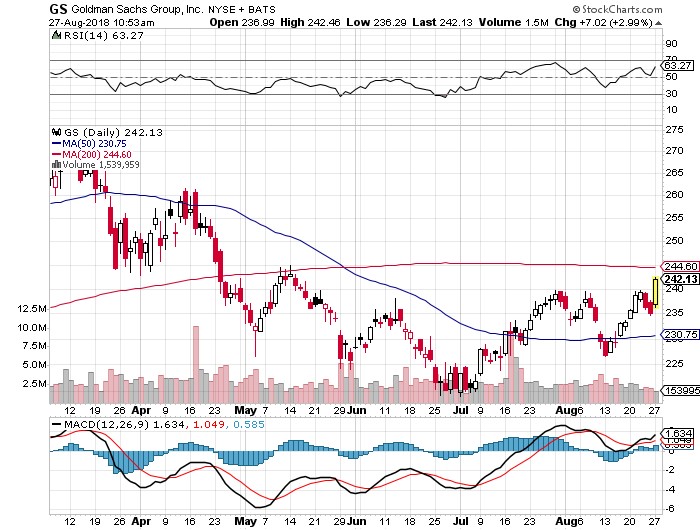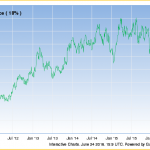I went to the local branch of Wells Fargo Bank (WFC) yesterday, and I was appalled. The bank occupied the most expensive corner in town. It was staffed by a dozen people, all of whom spoke English as a second language. Ask even the simplest question and they had to call a support center and wait 10 minutes on hold for the answer. It took an hour for me to open a checking account for one of my kids. The branch was in effect a glorified call center.
I thought, “This can’t last.” And it won’t. Banks were supposed to be the sector to own this year. They had everything going for them. The economy was booming, interest rates were rising, and regulations were falling like leaves in the fall.
Despite all these gale force fundamental tailwinds the banks have utterly failed to deliver. The gold standard J.P. Morgan is up only 8.46% on the year, while bad boy Citibank (C) is down 5.47%, and the vampire squid Goldman Sachs (GS) is off a gut-punching 10.27%. Where did the bull market go? Why have bank shares performed so miserably? The obvious reason could be that the improved 2018 business environment was entirely discounted by the big moves we saw in 2017. Last year, banks were the shares to own with JPM shares up a robust 24.5%, while C catapulted by 29.3%.
It is possible that bank shares are acting like a very early canary in the coal mine, tweeting about an approaching recession. Loan growth has been near zero this year. That is not typical for a booming economy. It IS typical going into a recession. When the fundamentals arrive as predicted but the stock fails to perform it can only mean one thing. The industry is undergoing a long-term structural change from which it may not recover. Yes, the bank industry may be the modern-day equivalent of the proverbial buggy whip maker just before Detroit took over the transportation business.
Managing a research service such as the Mad Hedge Technology Letter, it is easy to see how this is happening. Financial services are being disrupted on a hundred fronts, and the cumulative effect may be that it will no long exist. This explains why this is the first bull market in history where there has been no new hiring by Wall Street. What happens when we go into a bear market? Employment will drop by half and those expensive national branch networks will disappear.
Financial services are still rife with endless fees, poor service, and uncompetitive returns. Online brokers such as Robin Hood will execute stock and option transactions for free. Now that overnight deposits actually pay a return, they make their money on margin loans. They have no branch network but are still SIPC insured. Legacy brokers such as Fidelity and Charles Schwab (SCHW) used to charge $25 a share to execute and are still charging $7.00 for full-service clients. And it’s not as if their research has been so great to justify these high prices either. In a world that is getting Amazoned by the day, these high prices can’t stand.
Regular online banking service also pay interest and are about to eat the big banks’ lunch. Many now pay 1.75% overnight interest rates and offer free debit and credit cards, and checking accounts. Of course, none of these are household names yet, but they will be. To win the long-term investment game you have to identify the industries of the future and run from the industries of the past. The legacy financial industry is increasingly looking like a story from the past.













Leave A Comment